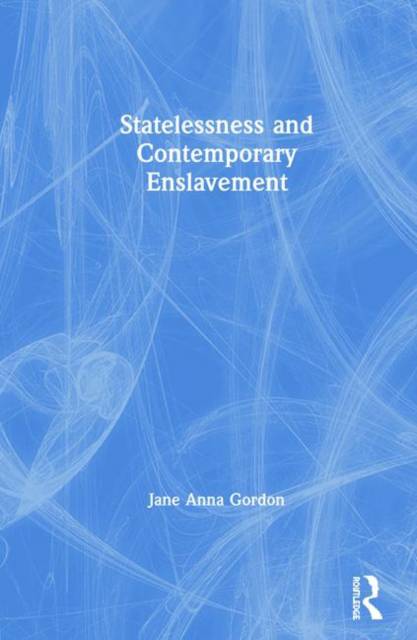
Door een staking bij bpost kan je online bestelling op dit moment iets langer onderweg zijn dan voorzien. Dringend iets nodig? Onze winkels ontvangen jou met open armen!
- Afhalen na 1 uur in een winkel met voorraad
- Gratis thuislevering in België vanaf € 30
- Ruim aanbod met 7 miljoen producten
Door een staking bij bpost kan je online bestelling op dit moment iets langer onderweg zijn dan voorzien. Dringend iets nodig? Onze winkels ontvangen jou met open armen!
- Afhalen na 1 uur in een winkel met voorraad
- Gratis thuislevering in België vanaf € 30
- Ruim aanbod met 7 miljoen producten
Zoeken
€ 274,95
+ 549 punten
Omschrijving
Why have statelessness and contemporary enslavement become endemic since the 1990s? What is it about global political economic policies, protracted warfare, and migration rules and patterns that have so systemically increased these extreme forms of vulnerability? Why have intellectual communities largely ignored or fundamentally rejected the concepts of statelessness and contemporary enslavement? This book argues that statelessness and enslavement are not aberrations or radical exceptions. They have been and are endemic to Euromodern state systems. While victims are discrete outcomes of similar processes of the racialized debasement of citizenship, stateless people share the predicament of those most likely to be enslaved and the enslaved, even when formally free, often face situations of statelessness. Gordon identifies forcible inclusion of semi-sovereign nations, extralegal expulsion of people who cannot be repatriated, and the concentrated erosion of the rights of full-fledged citizens as the primary modes through which people experience degrees of statelessness. She argues for the political value of seeing the connections among these discrete forms. With enslavement, she insists that while the centuries-long practice has taken on some new guises necessary to its profitability in the current global economy, what and who it involves have remained remarkably consistent. Rather than focusing on slavery as a radical and exceptional extreme of abuse or coercion, Gordon contends that we can understand contemporary slavery's specificity most usefully through considering its defining dimensions together with those of wage laborers and guest workers. Gordon concludes that appreciation of the situation of the stateless and of the enslaved should fundamentally orient our thinking about viable contemporary conceptions of consent and of the kinds of twenty-first-century political institutions that would make it harder for some to make the vulnerability of others so lucrative.
Specificaties
Betrokkenen
- Auteur(s):
- Uitgeverij:
Inhoud
- Aantal bladzijden:
- 164
- Taal:
- Engels
Eigenschappen
- Productcode (EAN):
- 9780367358532
- Verschijningsdatum:
- 10/12/2019
- Uitvoering:
- Hardcover
- Formaat:
- Genaaid
- Afmetingen:
- 155 mm x 231 mm
- Gewicht:
- 399 g

Alleen bij Standaard Boekhandel
+ 549 punten op je klantenkaart van Standaard Boekhandel
Beoordelingen
We publiceren alleen reviews die voldoen aan de voorwaarden voor reviews. Bekijk onze voorwaarden voor reviews.











